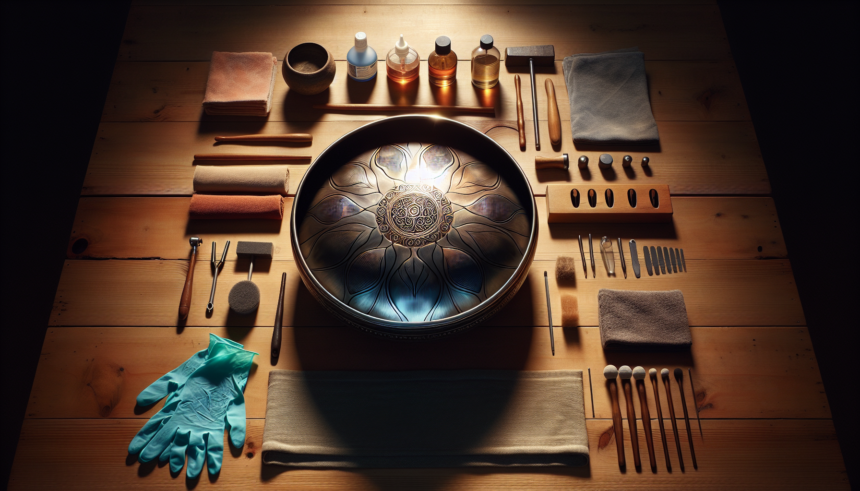<!DOCTYPE html>
<html lang="en">
<head>
<meta charset="UTF-8">
<meta name="viewport" content="width=device-width, initial-scale=1.0">
<title>Handpan Maintenance Kit</title>
</head>
<body>
<article>
<header>
<h1>Essential Items for Your Handpan Maintenance Kit</h1>
</header>
<section>
<p>The handpan is an exquisite musical instrument known for its ethereal sound and meditative qualities. Owning a handpan is a source of joy, but it also requires thoughtful maintenance to keep it in pristine condition. An essential part of caring for your handpan is having a well-equipped maintenance kit. This article will guide you through the essential items that should be included in your handpan maintenance kit to ensure a long-lasting and melodious experience with your treasured instrument.</p>
</section>
<section>
<h2>1. Soft Cleaning Cloths</h2>
<p>Handpans are sensitive and should be cleaned gently. Using a coarse or abrasive cloth can scratch the surface and damage the instrument. Therefore, investing in a few soft, microfiber cloths is crucial. These cloths are ideal for wiping down your handpan, removing fingerprints, dust, and other residues without causing any harm.</p>
</section>
<section>
<h2>2. Cleaning Solution</h2>
<p>Besides having a quality cloth, you should also have a suitable cleaning solution. Look for cleaning liquids specifically designed for steel instruments. Avoid using harsh chemicals or household cleaners as they might be too aggressive for the handpan’s surface. A gentle, pH-neutral cleaner will safely remove any oils and contaminants without corroding the metal.</p>
</section>
<section>
<h2>3. Protective Oils</h2>
<p>Handpans are made of steel, and even those treated for rust resistance could benefit from regular application of protective oil. This not only protects against rust but also keeps the handpan’s surface hydrated. Oils like Phoenix Oil or FrogLube are popular choices among handpan players. They create a protective layer, keeping moisture at bay and offering long-term protection.</p>
</section>
<section>
<h2>4. Tuning Devices</h2>
<p>While handpans do not require frequent tuning, having a reliable tuning device is beneficial. An electronic tuner can help you periodically check the tuning of your handpan. If you notice any discrepancies, instead of attempting to retune it yourself which could be risky, consult a professional tuner. Maintaining the correct pitch ensures that the handpan sounds as harmonious as it should.</p>
</section>
<section>
<h2>5. Rubber Mallets</h2>
<p>For minor adjustments and resonating notes, a set of rubber mallets is useful. Rubber mallets gently tap the handpan without damaging it, allowing you to make small adjustments to the sound. However, this should be done with caution, preferably under the guidance of someone experienced in handpan maintenance. The mallets should be of a suitable size and hardness, specific to the delicate nature of handpans.</p>
</section>
<section>
<h2>6. Hygrometer</h2>
<p>Maintaining the right environment for your handpan is key to its longevity. A hygrometer helps you monitor the humidity levels where your handpan is stored. Steel instruments are susceptible to rust in high humidity. Keeping the environment around 45-55% relative humidity and the temperature constant is optimal. If you live in a particularly humid area, using a dehumidifier can help protect your handpan.</p>
</section>
<section>
<h2>7. Humidifier (Optional)</h2>
<p>Conversely, if you live in an extremely dry area, a humidifier might be necessary. Extremely low humidity can cause materials to contract and become brittle. A humidifier helps maintain a stable environment, preventing drastic changes that can harm your handpan. Regularly check the hygrometer to ensure that conditions remain within the safe range.</p>
</section>
<section>
<h2>8. Carrying Case</h2>
<p>Protection during transport is just as important as at-home care. Investing in a high-quality carrying case with ample padding will shield your handpan from impacts and environmental elements. Look for a case that fits snugly and has compartments for storing smaller items like oils and cloths. A case with backpack straps can make transporting your handpan easier and more convenient.</p>
</section>
<section>
<h2>9. Desiccant Packs</h2>
<p>Desiccant packs, or silica gel packs, are small but mighty in maintaining the dryness of your handpan storage case. They absorb moisture, which is particularly useful in humid conditions or during lengthy transports. Place a few desiccant packs in your carrying case to prevent any unwanted moisture buildup.</p>
</section>
<section>
<h2>10. Gloves</h2>
<p>Wearing gloves when handling your handpan can help avoid transferring oils and dirt from your hands onto the instrument. Fingerprints and oils can eventually lead to corrosion. A pair of lint-free cotton or nitrile gloves is sufficient to handle the instrument safely, especially when cleaning or applying protective oils.</p>
</section>
<footer>
<h2>Conclusion</h2>
<p>Proper maintenance of your handpan is essential to preserve its beauty and ensure it produces its magical sound for years to come. Assembling a comprehensive handpan maintenance kit with the items listed above will enable you to care for your instrument effectively. With regular cleaning, appropriate storage, and careful handling, your handpan can remain in top condition, providing endless hours of musical meditation and enjoyment.</p>
</footer>
<section>
<h2>Frequently Asked Questions</h2>
<ol>
<li>
<strong>Q: How often should I clean my handpan?</strong>
<p>A: Ideally, you should wipe down your handpan after each use to remove sweat and fingerprints. A more thorough cleaning with a suitable solution and oil application can be done monthly.</p>
</li>
<li>
<strong>Q: Can I use any oil on my handpan?</strong>
<p>A: No, it’s recommended to use oils specifically designed for steel instruments. Phoenix Oil or FrogLube are good options. Avoid cooking oils or any oil that can go rancid.</p>
</li>
<li>
<strong>Q: Is it safe to tune my handpan myself?</strong>
<p>A: While you can use an electronic tuner to check the pitch, it’s recommended to seek professional tuning services for adjustments. Incorrect tuning attempts can permanently damage the handpan.</p>
</li>
<li>
<strong>Q: How should I store my handpan when not in use?</strong>
<p>A: Store your handpan in a dry, climate-controlled environment with consistent temperature and humidity levels. Use a carrying case with desiccant packs for added protection.</p>
</li>
<li>
<strong>Q: What should I do if my handpan starts to rust?</strong>
<p>A: Minor rust can often be managed with fine-grade steel wool and a protective oil. For significant rust issues, it’s best to consult a professional to avoid compromising the instrument’s integrity.</p>
</li>
</ol>
</section>
</article>
</body>
</html>Essential Items for Your Handpan Maintenance Kit

Leave a comment




